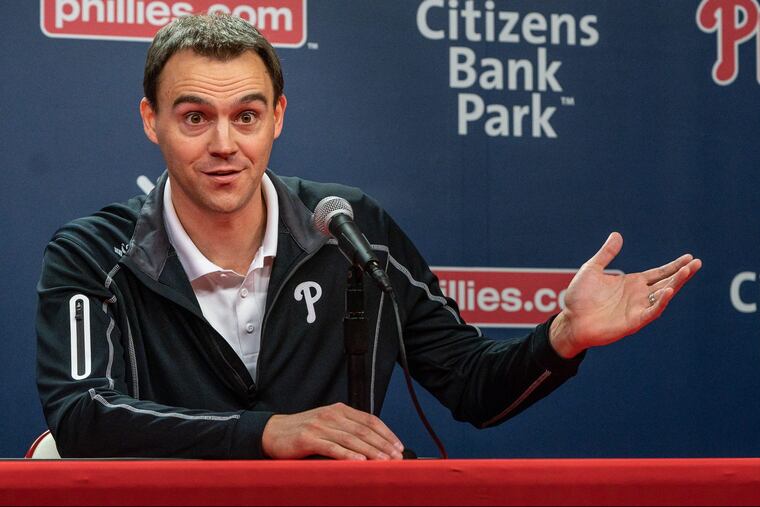After failing to deal for a top starter at MLB trade deadline, Phillies put focus on offseason for improving their rotation
"There was no player out there that we didn't have the talent to acquire if we chose to," Phillies GM Matt Klentak said after choosing not to go big at the trade deadline.

At about 4:30 p.m. Wednesday, after general managers across baseball finally put down their phones and their No. 2 pencils, Matt Klentak came before the media at Citizens Bank Park and declared that he had more or less done what he said he was going to do.
With a series of small moves that began nearly two months ago, bookended by trades for lefty-hitting outfielders Jay Bruce on June 2 and Corey Dickerson on deadline day, Klentak made the Phillies’ roster deeper to gird for a two-month playoff push while also not giving away future assets.
Mission accomplished, right?
Not even close.
Maybe Bruce and Dickerson, starters Drew Smyly and Jason Vargas, relievers Mike Morin and Blake Parker, utility man Brad Miller and triple-A depth options Logan Morrison, Jose Pirela, and Dan Straily will nudge the Phillies into the postseason for the first time since 2011. For a franchise that has been excluded from the party for so long, the second wild-card berth in the National League would represent progress.
But even if that happens, the Phillies have hanging over them the challenge of improving a starting rotation that is desperate for another controllable pitcher or two. They could have addressed it now, and according to Klentak, they tried. But rather than pulling the trigger on a deal for Mike Minor or Matthew Boyd, Robbie Ray, Trevor Bauer or Marcus Stroman, they opted for a lower-cost option (Vargas) and a reclamation project (Smyly) as potential short-term fixes and kicked the can into the offseason.
"You can't trade your top [prospects] at every opportunity," Klentak said. "There are times to do that and there are times not to. We were willing to do it now if we lined up. What we ended up doing was raising the floor of the organization and providing support for our club to make a run the next two months."
That’s fine. But it also means that Klentak’s upcoming offseason will be defined by a laser-focused pursuit of pitching, whether it’s throwing $200 million at free agent-to-be Gerrit Cole or giving up a prized prospect or two in a trade. Going into another season with fingers crossed over Vince Velasquez, Nick Pivetta, and Zach Eflin all being big-league-caliber starters won’t cut it.
It was notable that the trade deadline passed with Minor staying put in Texas, Boyd in Detroit, and Ray in Arizona. Three pitchers who were rumored for weeks to be on the move wound up not going anywhere, confirmation of what several talent evaluators suggested Wednesday was an astronomical asking price from the Rangers, Tigers, and Diamondbacks.
And the Phillies weren’t the only team that balked. The rotation-needy Milwaukee Brewers, in the hunt for both a wild-card berth and the National League Central title, came away with only triple-A depth starters Jake Faria and Ray Black.
“There was no player out there that we didn’t have the talent to acquire if we chose to,” Klentak said, “whether that was [with] minor-league prospects or players on our major-league team. We had the ability to do that.”
But the Phillies drew a line at trading 22-year-old third baseman Alec Bohm or touted 23-year-old right-hander Spencer Howard, and most of their conversations about bigger trades for controllable starting pitchers began and ended with those names. Bohm has 15 homers this season and is moving through the farm system at warp speed. It’s conceivable that he could be starting at third base by midseason next year. Howard struck out 10 batters in his double-A debut last week and has averaged 12.3 strikeouts per nine innings in his minor-league career.
It's understandable that the Phillies would walk away from trading either of them.
But the non-contending New York Mets were able to pry Stroman out of Toronto without giving up any of their top blue-chippers. Left-hander Anthony Kay was ranked as the Mets' fourth-best prospect by Baseball America, while right-hander Simeon Woods-Richardson was ranked sixth.
A rough Phillies equivalent: double-A right-hander Adonis Medina and 19-year-old righty Francisco Morales. That seems like a reasonable enough return, unless the Phillies simply weren’t enamored with Stroman, a ground-ball pitcher who compiled a 3.76 earned-run average and 3.61 fielding independent pitching and allowed an average of 0.8 homers per nine innings in six seasons of pitching in the American League East and is controllable through next season.
The Phillies could always circle back on, say, Minor or Boyd in the offseason. They've had interest in Minor before, looking into trading for him last winter. But there isn't any guarantee that the asking prices will be any lower five months from now just because acquiring them in December means getting them for one fewer pennant race that if they had been acquired the previous July. Boyd, in particular, is 28 years old and comes with three more years of club control. The Tigers will still want considerable value in return.
“In theory, the prices should go down, but it doesn’t necessarily meant that it will,” Klentak said. “This is all about supply and demand, and what’s available now might be different than what’s available in November and December. Markets, they are what they are. They develop for their own reasons.”
True, but the next time that pitching supply outweighs the demand for quality starters will be the first. In balking at the high prices now, the Phillies only guaranteed that they will still have to pay it this winter.